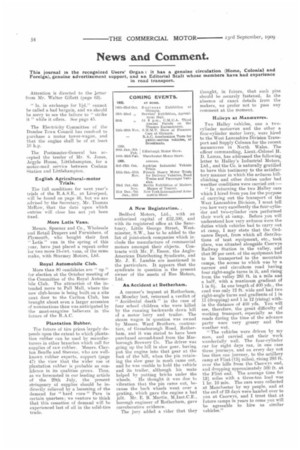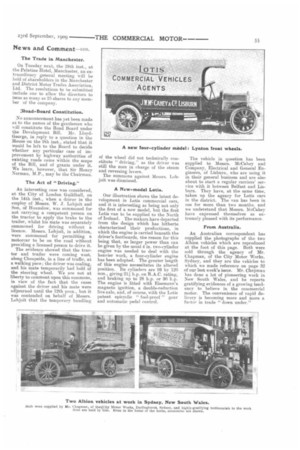News and Comment.
Page 10

Page 11

If you've noticed an error in this article please click here to report it so we can fix it.
This journal is the recognized Users' Organ : it has a genuine circulation (Home, Colonial and Foreign), genuine advertisement support, and an Editorial Stall whose members have had experience in road transport.
Attention is directed to the letter from Mr. Walter Gillett (page 63). "
is. in exchange for 11d." cannot be called a bad bargain, and we should be sorry to see the failure to " strike it" while it offers. See page 45.
The Electricity Cemmittee of the Dundee Town Council has resolved to purchase a motor tower-wagon, and that the engine shall be of at least 16 h. D.
The Postmaster-General has accepted the tender of Mr. S. Jones, Argyle House, Littlehampton, for a motor-mail service between Cosham Station and Littlehampton.
English Agricultural-motor Trials.
The full conditions for next year's trials of the R.A.S.E., at Liverpool, will be found on page 46, but we are advised by the Secretary, Mr. Thomas Mellow, that the date upon which entries will close has not yet been fixed.
More Loth& Vans.
Messrs. Spooner and Co., Wholesale and Retail Drapers and Furnishers. of Plymouth, who bought their first " Lotis " van in the spring of this year, have just placed a repeat order for two more 15-cwt. vans, of the same make, with Sturmey Motors, Ltd.
Royal Automobile Club.
More than 80 candidates, are " up " for election at the October meeting of the Committee of the Royal Automobile Club. The attraction of the intended move to Pall Mall, where the new club-house is being built on a site next door to the Carlton Club, has brought about even a larger accession of nominations than was anticipated by the most-sanguine believers in tho future of the R.A.C.
Plantation Rubber.
The future of tire prices largely depends upon the extent to which plantation rubber can be used by manufacturers in other branches which call for supplies of raw rubber. Messrs. Clayton Beadle and Stevens, who are wellknown rubber experts, support (page 47) the view that the wider use or plantation rubber is probable as confidence in its qualities grows. Thus, as we forecasted in our leading article of the 29th July, the present stringency of supplies should be indirectly relieved by a lessening of the demand for " hard cure" Pam in certain quarters ; we venture to think that this cessation of demand will be experienced last of all in the .solid-tire trade.
A New Registration. .
Bedford Motors, Ltd., with an authorized capital of £52,500, and with its registered office at the Sanctuary, Little George Street, Westminster, S.W., has to be added to the list of joint-stock companies which include the manufacture of commercial motors amongst their objects. Contracts with Mr. F. Eason, the AngloAmerican Distributing Syndicate, and Mr. J. E. Lambie are mentioned in the particulars. It appears that the syndicate in question is the present owner of the assets of Reo Motors, Ltd.
An Accident at Rotherham.
A coroner's inquest at Rotherham, on Monday last, returned a verdict of " Accidental death " in the case of four school children who were killed by the running backwards down hill of a motor lorry and trailer. The steam wagon in question was owned by Messrs. Ward Brothers, contractors, of Greasborough Road, Rotherham, and it was stated to have been purchased second-hand from the Masborough Brewery Co. The driver was going up the hill in slow gear, having put the engine into that gear at the foot of the hill, when the pin retaining the slow gear in mesh came out, and he was unable to hold the vehicle and its trailer, although his mate helped by putting bricks under the wheels. He thought it was due to vibration that the pin came out, because the back wheels went over a grating, which gave the engine a bad jolt. Mr. E. B. Martin, M.Inst.C.E., borough engineer of Rotherham, gave corroborative evidence.
The jury added a rider that they
thought, in future, that such pins should be securely fastened. In the absence of exact details from the makers, we prefer not to pass any comment at the moment.
Halleys at Manceuvres.
Two Halley vehicles, one a twocylinder motorvan and the other a four-cylinder motor lorry, were hired to the West Lancashire Division Transport and Supply Column for the recent rnanceuvres in North Wales. The officer commanding, Lieut.-Colonel H. D. Lomas, has addressed the following letter to Halley's Industrial Motors, Ltd., and the Co. is naturally gratified to have this testimony to the satisfactory manner in which the arduous hillclimbing and other duties under bad weather conditions were carried out :— "In returning the two Halley cars which I hired from you for the purpose of carrying out the transport of the West Lancashire Division, I must tell you how very excellently the four-cylinder and two-cylinder cars performed their work at camp. Before you will understand how very arduous were the duties which vehicles had to carry out at camp, I may state that the Ordnance Depot, from which all distributions of tent equipment, etc., took place, was situated alongside Caerwys Railway Station in the valley, and that 90 per cent, of the equipment had to be transported to the mountain camps, the access to which was by a narrow and circuitous road having four right-angle turns in it, and rising from the valley 285 ft. in a mile and a half, with a maximum gradient of 1 in 6-i. In one length of 400 yds., the road was only 12 ft. wide and had two right-angle turns and gradients of 1 in 11 (dropping) and 1 in 12 (rising) within the distance of 400 yds. You will see, therefore, the great difficulty of working transport, especially as the roads during the time of the advance party were very greasy and the weather wet.
"The vehicles were driven by my men, and carried out their work wonderfully well. The four-cylinder car for eight days ran, in one case three journeys, and on every day not less than one journey, to the artillery camp at Flint (13-1 miles), rising 285 ft. over the hills from the Caerwys end, and dropping approximately 500 ft. at the Flint end. The average time for 131 miles with a three-ton load was 1 hr. 10 min. The cars were collected at Manchester by my people, and at the end of 23 days were handed over to van at Caerwys, and I trust that at future camps in years to come you will be agreeable to hire us similar vehicles." The Trade in Manchester.
On Tuesday next, the 2tlt inst., at the Palatine Hotel, Manchester, an extraordinary general meeting will be held of shareholders in the Manchester and District Motor Trades Association, Ltd. The resolutions to be submitted include one to allow the directors to issue as many as 25 shares to any member of the company.
:Road-Board Constitution.
No announcement has yet been made as to the names of the gentlemen who will constitute the Road Board under the Development Bill. Mr. LloydGeorge, in reply to a question in the House on the 9th inst., stated that it would be left to the Board to decide whether any particular case of improvement by highway authorities of existing roads came within the scope of the Bill, and of grants under it. We learn, however, that Sir Henry Norman, M.P., may be the Chairman.
The Act of "Driving."
An interesting case was considered, at the City of London Guildhall, on the 14th inst., when a driver in the employ of Messrs. W. J. Lobjoit and Son, of Hounslow, was summoned for not carrying a competent person on the tractor to apply the brake to the trailer, whilst his mate was separately summoned for driving without a licence. Messrs. Lobjoit, in addition, were summoned for permitting a motorcar to be on the road without providing a, licensed person to drive it.
The evidence showed that the tractor and trailer were coming west, along Cheap,side, in a line of traffic, at a walking pace ; the driver was coaling, and his mate temporarily had hold of the steering wheel. We are not at liberty to comment upon this summons, in view of the fact that the cases against the driver and his mate were adjourned until the 12th pros., but it was contended on behalf of Messrs. Lohjoit that the temporary handling
of the wheel did not technically constitute "driving," as the driver was still the man in charge of the steam and reversing levers.
The summons against Messrs. Lobjolt was dismissed.
A New-model Lode.
Our illustration shows. the latest development in Lotis commercial cars, and it is interesting as being not only the first of a new model, but the first Lotis van to be supplied to the North of Ireland. The makers have departed from the design which has hitherto characterized their productions, in which the engine is carried beneath the driver's footboards, the reason for this being that, as larger power than can be given by the usual 4 in. two-cylinder engine was needed to deal with the heavier work, a four-cylinder engine has been adopted. The greater length of this engine necessitates its altered position. Its cylinders are 93 by 120 mm., giving 24 h.p. on R.A.C. rating, and braking up to 28 h.p. or 30 h.p. The engine is fitted with Eisemann's magneto ignition, a double-reduction live axle, and, of course, with the Lotis patent epicyclic " fool-proof " gear and automatic pedal control.
The vehicle in question has been supplied to Messrs. McCahey and Company, Electrical and General Engineers, of Lisburn, who are using it in their general business and are also about to start a regular carriers' service with it between Belfast and Lisburn. They have, at the same time, taken up the agency for Lotis cars in the district. The van has been in use for more than two months, and we understand that Messrs. McCahey have expressed themselves as extremely pleased with its performance.
From Australia.
An Australian correspondent has supplied the photographs of the two Albion vehicles which are reproduced at the foot of this page. Both were sold through the agency of Mr. Chapman, of the City Motor Works, Sydney, and they are the vehicles to which we made reference on page 32 of our last week's issue. Mr. Chapman has done a lot of pioneering work in New South Wales, and he reports gratifying evidences of a growing tendency to believe in the commercial motor. The convenience of rapid delivery is becoming more and more a factor in trade " down under."






















